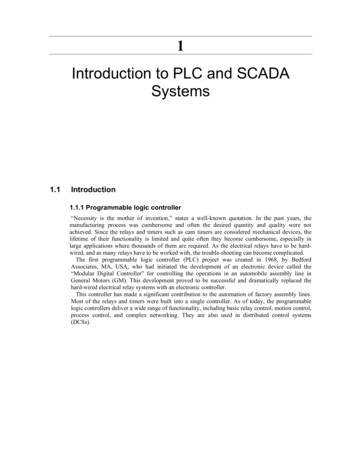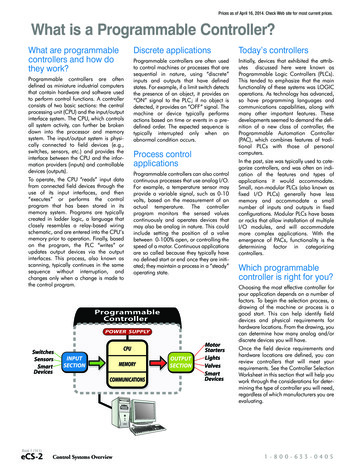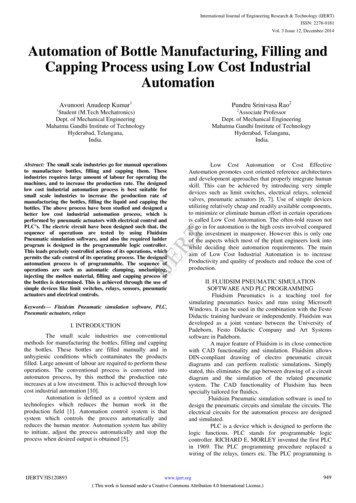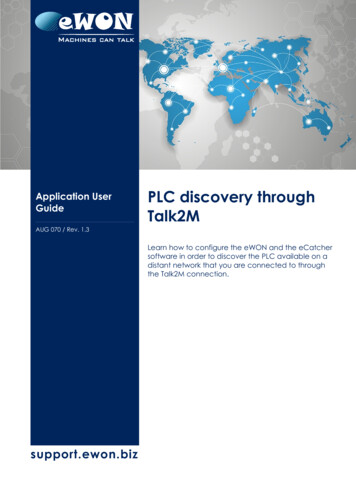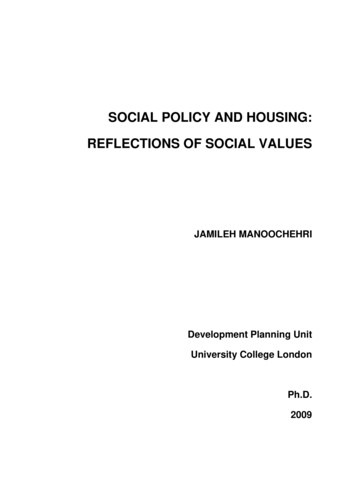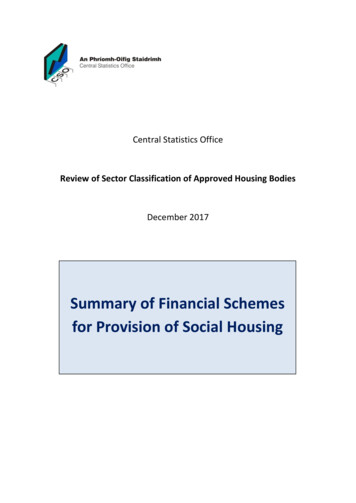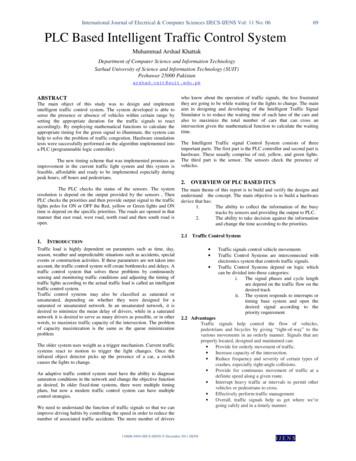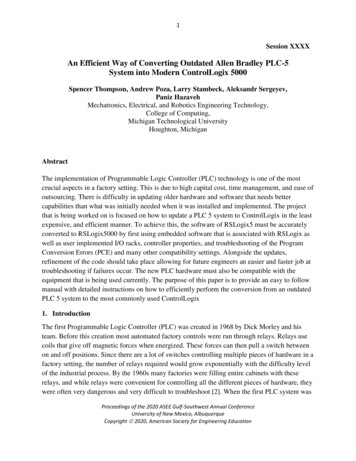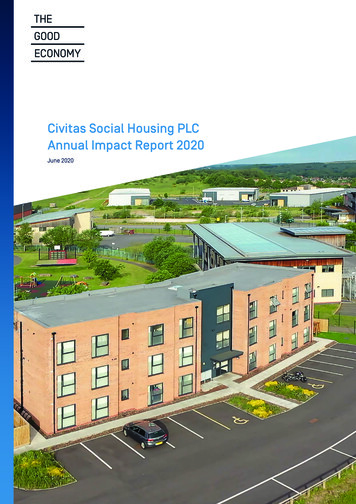
Transcription
Civitas Social Housing PLCAnnual Impact Report 2020June 2020
Civitas Social Housing PLC, Annual Impact Report, June 2020CONTENTSImpact Report – Headline Results4Executive Summary61 / Introduction9About Civitas9Covid-199Market and Policy Context10The Civitas Funding Model11This Report132 / Impact Measurement and Management FrameworkThis report has been commissioned by Civitas Social Housing PLC (“Civitas”) and has been prepared by The Good Economy Partnership Limited(“The Good Economy”), a leading social advisory firm, specialising in impact measurement and management.The Good Economy supported Civitas to develop its impact assessment methodology and carries out a review of the social performanceof Civitas on a semi-annual basis. This report is based on analysis of quantitative data and evidence, as well as in-depth interviews withmanagement and staff of Civitas Investment Management (the investment advisor to Civitas), partner housing associations, Care Providers, localauthorities and tenants, including a Tenant Outcomes Survey carried out with a representative sample.The findings and opinions conveyed in this report are based on information obtained from a variety of sources which The Good Economy believesto be reliable and accurate. However, the information reviewed should not be considered as exhaustive and The Good Economy, its principals andstaff cannot and does not guarantee the accuracy, completeness and or fairness of the information and opinions contained herein. This reportshall not be construed as a financial promotion or as a recommendation, invitation or inducement to any person to engage in investment activity.This report has been prepared solely for the benefit of Civitas and no other person may rely upon this report. Accordingly, The Good Economyaccepts no duty of care, responsibility or liability (whether in contract or tort (including negligence) or otherwise) to any person other than Civitasfor any loss, costs, claims or expenses howsoever arising from any use or reliance on this report.The information within this report is subject to change relative to new developments, facts and or research. The Good Economy thereforereserves the right (but is under no obligation) to alter the conclusions and recommendations presented in this report in light of furtherinformation that may become available.14Stakeholders14Investment Process15Impact Assessment Methodology163 / Social Impact Analysis and Results3.118Increase the supply of specialist housing183.2 Improve the quality of specialist housing223.3 Improve tenant wellbeing253.4 Provide value for money263.5 Impact Risk Mitigation283.6 Additional Impact344 / Alignment with the UN Sustainable Development Goals355 / Case Studies37Deep Dive Case Study – Bedwardine Court6 / Social Partners3742Crisis: Together we will end homelessness42The Choir with No Name: Choirs for people affected by homelessness43The House of St. Barnabas: Members’ club aiming to break the cycle of homelessness44Women in Social Housing (WISH)457 / Conclusions and Recommendations46Appendix48Appendix 1: List of Registered Providers48Appendix 2: List of Top 10 Care Providers49
Civitas Social Housing PLC, Annual Impact Report, June 2020IMPACT REPORT – HEADLINE RESULTS 789AS OF 31 MARCH 2020LOCATED ACROSS164 LOCAL AUTHORITIESMILLIONINVESTEDCIVITAS SOCIAL HOUSING PLC – ANNUAL IMPACT REPORT 2020WITH THE CAPACITY TO PROVIDEA HOME FOR 4,216 PEOPLEWith learning or physical disabilitiesand medium to high care needsAVERAGE AGE OF 32 YEARSIN 613PROPERTIESMANAGED BY15 HOUSINGASSOCIATIONS33% OF PROPERTIESCONVERTED TOSOCIAL HOUSINGFOR THE FIRST TIME 493 755 789MILLION MILLION MILLIONINVESTED INVESTED INVESTEDMARCH 2018 MARCH 2019 MARCH 2020466% OF PROPERTIESIN THE 40%MOST DEPRIVEDLOCAL AUTHORITIES 3.50 IS CREATEDIN SOCIAL VALUEFOR EVERY 1OF ANNUALISED INVESTMENTIN 428 IN 591IN 613PROPERTIES PROPERTIES PROPERTIESMARCH 2018 MARCH 2019 MARCH 202036%RESIDENTS ARESUPPORTEDTHROUGH CAREAND SUPPORTPROVISION64%GENDER SPLITAVERAGE 25 YEAR LEASESPROVIDE SECURITY TO TENANTSBY 117 CARE PROVIDERSPROVIDINGA HOMEFOR UP TO2,758 4,0724,216PEOPLE PEOPLE PEOPLEMARCH 2018 MARCH 2019 MARCH 20205
Civitas Social Housing PLC, Annual Impact Report, June 2020EXECUTIVE SUMMARYThis is the third Annual Impact Report for Civitas Social Housing PLC (“Civitas”)which was launched in November 2016 as the first Real Estate InvestmentTrust (REIT) specialised in investing in social housing, with a focus on specialistsupported living. During this 3.5-year period, the Fund has invested 789 millionin 613 properties, providing housing for up to 4,216 tenants.Improve the quality of specialist housingCivitas continues to set aside funding to improve and renovate its homes to ensure they remain fit-for-purpose. In someinstances, Civitas has stepped in to repurpose buildings where the layout was not effectively addressing the specific needs ofindividual tenants and made appropriate changes to remedy any issues that arise. Civitas also undertakes quarterly monitoringvisits with its partner RPs and monthly checks of compliance-related issues e.g. Fire Risk Assessment and Gas Certificates. Ina portfolio of 613 buildings, there will always be a need to undertake asset management activities above and beyond the leaseobligations of the RPs. TGE are pleased to see that Civitas is proactive in this regard and has committed capital to works on itsproperties.This impact assessment, completed by The Good Economy (TGE), is specifically focused on activity between October 2019 andMarch 2020. Over this six-month period, Civitas has acquired 14 new properties, of which nine were brought into the socialhousing sector for the first time, with these properties having the potential to house 102 people.Improve tenant wellbeingSurvey data suggests that Civitas homes and care provision are having a positive impact on tenant wellbeing. During May to July2019, a survey was carried out with 205 tenants covering 67% of Civitas’ partner RPs and 16% of CPs. 63% of support workersreported that their tenant’s mental health had improved since moving into the accommodation and nine out of the ten familymembers we spoke to stated that the motivation and aspirations of the person cared for had increased. Note that TGE could notcarry out a similar survey this year due to Covid-19.In our November 2019 report, we stated that “TGE positively views the actions that Civitas has taken to support its partnerRegistered Providers (RPs)” and this remains the case with the work and support highlighted in this new report.Since February 2020, the global Covid-19 pandemic has dominated most aspects of society. This has impacted social care inmultiple ways and has been widely reported in the media as a particular challenge in elderly care homes. By comparison, Civitashas conducted extensive discussions with the specialist care providers (CPs) who deliver services into Civitas properties, andwhilst there have been challenges, these have not been of the same magnitude as for elderly care, reflecting the much youngerage profile (c. 32 years) of the tenants.Civitas has contributed directly to the Covid-19 response though offering 29 of its fully refurbished self-contained units fortemporary use by a London Council in responding to the pandemic. The Fund has also encouraged its care provider partnersto engage directly with the NHS to ascertain if services can be delivered to assist in combating the pandemic.Provide value for moneyAccording to the monetisation calculations completed by the Social Profit Calculator in 2019, the Civitas portfolio is generating 64.7 million of direct fiscal savings to local and national government per year. This is part of the overall 114 million of socialvalue that is generated on an annual basis. This finding is supported by direct evidence from a local authority commissioner atWorcestershire County Council who reported the savings made from a specific Civitas-owned supported housing property. It is alsoconsistent with research on the Specialist Supported Housing sector by the charity Mencap, and with statements that have beenmade by government ministers on the net benefit to the wider public purse of providing supported housing.Impact risk mitigationCivitas is continuing to take action to address the concerns of the Regulator of Social Housing (RSH), working to support itspartner RPs whilst at the same time demonstrating the value and positive personal outcomes that are being delivered for upto 4,216 tenants.Social Impact AssessmentThis report provides an assessment of Civitas’ performance against its stated impact objectives:Increase the supply of specialist housingImprove the quality of specialist housingImprove tenant wellbeingProvide value for moneyThroughout this process, mitigate against negative impact risksTGE’s impact analysis is aligned with the five dimensions of impact as set out by the Impact Management Project.Increase the supply of specialist housingCivitas is continuing to grow its portfolio although this has been at a slower pace than in previous years. The Fund has spent muchtime working with its RPs and care provider partners to continue to add strength to the portfolio and the business operations ofits partners.Its updated lease agreements (with a force majeure clause and a cap and collar on rent increases) are being used for all newleases. More broadly, Civitas continues to devote considerable time and effort to assisting and working with its RP partners.The Community Interest Company (CIC), ‘The Social Housing Family’, sponsored by Civitas Investment Management (CIM), now hasone RP as a member. The CIC aims to provide capacity-building support to SSH RPs in the sector and TGE are supportive of Civitas’intent to help strengthen the capacity and financial viability of these small specialist RPs. We have been informed that CIM is indiscussions with other RPs about potentially joining the CIC but understand that the decision to become a member rests withindividuals RPs and their boards. As progress is made and more members join the CIC, TGE will provide further comment on theimpact of the CIC’s activities.Overall, TGE is of the opinion that Civitas has taken active steps in respect of the risks identified by the RSH although it itself is notan RP and much of the response to the RSH rests with the RPs themselves. The Fund has enhanced its newer leases in responseto comments made by the RSH and continues to engage with the Regulator and with RPs to seek to further mitigate risk.In the last six months the Fund has acquired 14 more properties (a 2% increase since September 2019). This rate of growth is lowerthan previous years but TGE are encouraged that most of these new properties (64%) are being brought into the social housingsector for the first time. This compares favourably with the rest of the portfolio where 33% of properties have been brought intothe social housing sector for the first time.67
Civitas Social Housing PLC, Annual Impact Report, June 2020StrengthsCivitas is investing at large-scale and have established themselves as a leading specialist investment fund in specialisedsupported housing, an area where there is high demand and social need.Specialist supported housing has a positive impact on the wellbeing of tenants and contributes to improved mentaland physical health.Civitas has taken a proactive approach to supporting RPs and care providers during the Covid-19 crisis and to exploringhow its properties could be used by local authorities and the NHS.Specialist supported housing is good value for money for the public purse, compared to residential or hospital care.Potential Weaknesses and Mitigating ActionsThe RSH has highlighted what it sees as certain risks to RPs. Civitas needs to remain focused on, where possible,contributing to reducing these risks and ensuring that its funding model works well from the perspective of supportingthe long-term sustainability of partner RPs and high-quality supported housing provision.Consider updating historic leases to incorporate the Force Majeure clause.The CIC currently only has one member. Civitas must continue to work with other RPs and their boards to determine if othersfeel it is appropriate for them to become members of the CIC, whilst respecting that it is a decision for each respective RPboard. TGE will continue to monitor progress in this regard.Civitas is currently at an early stage in working through its portfolio to minimise the environmental impact of its homes.Environmental performance (as part of ESG) is becoming a key area that asset owners are looking at.TGE welcomes Civitas’ development of a strategy to improve the energy efficiency of its homes, and its disclosure of EPCratings for its portfolio for the first time.The last 12 months has seen a drop in the rate of adding new homes to the portfolio.There continues to be a large unmet social need for SSH that Civitas is well placed to meet, having developed robustsystems and strong partnerships within the sector.Over the last twelve months there have been significantly fewer investments than in previous years.Civitas Investment Management (CIM) have indicated that they have a strong pipeline and would expect to seemore investment over the next 12 months.1 / INTRODUCTIONAbout CivitasCivitas Social Housing PLC (“Civitas”) is the UK’s first social housing Real EstateInvestment Trust (REIT) launched on the London Stock Exchange in November 2016.1Civitas’ social objective is to help tackle the chronic shortage of social housing in the UK, with a current focus on the provisionof Specialist Supported Housing (SSH) for individuals with complex care needs. It raises capital at large scale from institutionaland retail investors and uses the funds raised to provide long-term equity to the social housing sector, buying properties andleasing them back to Registered Providers (RPs) to be rented as social housing for the long-term. As of 31 March 2020, Civitashas invested 789 million in 613 properties across the UK.Specialist Supported Housing (SSH) is an essential community service whereby individuals with a range of physical or learningdisabilities are able to live in their own home normally with 24/7 care available on-site. It enables even those with the mostcomplex needs to live in the community, with more independence than they would be afforded in a residential home.Covid-19The Covid-19 outbreak is presenting significant challenges and operational pressures for the social housing sector on numerousfronts. For RPs managing SSH properties, there are service challenges relating to the delivery of repairs and maintenance, giventhe need to enforce social distancing measures to protect both customers and staff. In all cases, the RPs are closely followingthe guidance issued by the Regulator of Social Housing (RSH).For care providers (CPs), there are the challenges of continuing to provide high quality care whilst protecting staff and thosein care from infection, as well as managing when staff are having to self-isolate. Despite these difficulties however, evidencesuggests that the specialist care sector has, to date, performed well during the pandemic, with relatively few cases amongsttenants and staff, and with services to individuals not suffering disruption.Civitas is in regular contact with all of its RP partners and major CPs. Detailed feedback confirmed that instances of Covid-19have been very limited within the Civitas portfolio and that service levels have been maintained. CPs have informed Civitas thatthey have instituted new working procedures and in a number of cases staff have self-isolated on a voluntary basis so that theyare available to replace colleagues who may report sick.With relatively few cases, there has not to date been an issue with an increase in voids that cannot be filled with people waitingfor accommodation. One leading CP in Wales has reported to Civitas that they have been very successful in filling the smallnumber of vacancies that have occurred, usually with younger residents who have a more acute need for care services.In response to the outbreak, the RSH has been providing regular updates to the sector. RPs are expected to contact the RSH ifthey are struggling to meet challenges and there is a resulting threat to tenant safety or to the provider’s financial viability. Therehas been acknowledgment from the RSH that the impact of the outbreak may mean there will be some incidence of statutorynon-compliance and repairs backlogs as providers are forced to prioritise emergency maintenance issues.TGE is wholly aware of the unprecedented nature of the challenges presented by the Covid-19 outbreak for the social housingsector. These challenges have been incorporated into the social impact analysis of Civitas’ portfolio for this report. Particularattention has been directed towards understanding the ability of Civitas’ partner RPs and CPs to continue providing theiressential services to tenants, and the steps that Civitas is taking in supporting them to do so. Overall, TGE is satisfied that Civitasis being proactive in taking steps to support its partners in the circumstances to maintain their service delivery.1. Civitas Social Housing PLC (Civitas) is the Fund, and Civitas Investment Management Ltd (CIM) is the investment advisor to the Fund. Note that CIM underwent a name changeas of 7 May 2020 from Civitas Housing Advisors Ltd to Civitas Investment Management Ltd to better reflect the range of investment activities now undertaken by the company.89
Civitas Social Housing PLC, Annual Impact Report, June 2020Long-stayNHS HospitalRehabilitationServiceCare HomeSupported LivingCommunityLong-stay NHS HospitalRehabilitation ServiceCare HomeSupported LivingCommunityProvidersNHS / IndependentNHS / IndependentLocal Authority /IndependentSpecialistSupported Housingand Care ProvidersCare ProvidersFundingNHSNHS / LANHS / LALALAHospital-basedcare and supportCare and support tofacilitate transition fromhospital to residentialResidential careand supportHome-basedcare and supportCommunity basedcare and supportServiceUsers/OfferWhilst supported living is typically the preferred model of care, local authoritiesare facing a chronic shortage of housing stock that is both affordable andsuitable to meet the needs of adults with specialist care needs.The development of SSH, such as that provided by Civitas Social Housing, ishelping to meet this high and rising demand for specialist supported housing.Market and Policy ContextSpecialist Supported Housing became widely recognised as an important community service following the Winterbourne Viewscandal which brought to light the potential dangers for vulnerable individuals of remaining in institutional care long-term, and ledto a growing recognition of the benefits of community based social housing. As a result, the Care Act 2014 and the government’s‘Transforming Care Agenda’ have sought to prioritise the ‘suitability of accommodation’ in meeting the home care and supportneeds of vulnerable people, reducing reliance on hospital and residential services and encouraging a shift towards supportedliving settings.2In addition to the view that supported living settings benefit the wellbeing of tenants, there is also strong independent evidencethat SSH is a cost-effective way of providing housing to those with complex needs. A report by Mencap, a leading UK charity forpeople with learning disabilities, indicates that a person living in SSH requires, on average, state funding of 1,569 per week forhousing and care. This compares favourably with the costs of alternative living arrangements for those with complex care needs.According to the report, the weekly cost to the public purse of SSH is 191 lower when compared to a residential care placement,and 1,931 lower when compared to an inpatient place.3Most, if not all, of the tenants within SSH are eligible for and claim Housing Benefit to cover the cost of their accommodation.Following a consultation exercise, the government confirmed in 2018 that the funding mechanism would continue, rather thanbeing devolved to a local authority controlled budget. This move was widely welcomed and taken as further indication of thegovernment’s acknowledgement of the importance of funding SSH for vulnerable people.Specialist Supported Housing (SSH) is an essential community service wherebyindividuals with a range of physical or learning disabilities are able to live in theirown home normally with 24/7 care available on-site. It is a way for even those withthe most complex needs to live in the community, with more independence thanthey would be afforded in a residential home.The Civitas Funding ModelThe funding market for social housing is changing rapidly. With declining government funding, RPs are increasingly having toexplore alternative forms of private finance (beyond bank debt) to support new developments. At the same time, many large RPshave chosen not to provide SSH, regarding it as a more complex form of housing delivery. Local authorities generally require SSHto be well dispersed within a community setting and this does not suit the large-scale block delivery methods typical of largehousing associations who want to develop houses in large volumes on limited sites.As a result, it is smaller, often newer, specialist housing associations that provide SSH. Civitas works with these small specialistproviders but is also beginning to achieve traction with some of the older, mid-sized housing associations that deliver SSH andappreciate the high level of social value that it brings.Civitas and other housing funds are bringing in new funding models to social housing, backed by institutional investors. Thesefunds provide long-term equity to the social housing sector, using the capital raised from investors to buy properties, thenleasing them to RPs to manage, with rental income used to fund investor returns.The launch of these new funds has enabled an increase in the provision of much needed specialist housing, and is welcomed bylocal authority commissioners who are responsible for the care of vulnerable individuals. However, some commentators in thesocial housing sector have questioned the lease based model.The RSH has voiced concern at this type of model, publishing an addendum to its annual ‘Sector Risk Report’ in April 2019regarding “Lease-based providers of specialised supported housing”. The RSH’s view is that over-reliance on long-term, inflationlinked leases creates significant risk exposures for RPs, particularly small organisations who have thin capitalisation and do nothave appropriate risk management or contingency planning.As a result of its concerns around the quality of governance and financial capacity to manage downside risks, the RSH hasissued regulatory judgements or notices to ten lease-based supported housing providers within the sector. Five of these arepartner RPs to Civitas. Another risk that was identified for the whole sector, is the lack of knowledge on, and upkeep of, existingstock. The RSH raised a concern that, where returns were demanded by an investor, this may come at the expense of long-terminvestment and other services.In the most recent annual ‘Sector Risk Profile’ for 2019 the RSH affirmed “The risks identified [in the SSH Addendum] continueto be a significant concern”. In order to draw attention to these ongoing concerns, the RSH has stated that it is consideringpublishing a follow-up to last year’s Addendum regarding lease-based SSH providers. TGE will continue to monitor and review anyrelevant documentation released by the RSH and assess Civitas’ response to its stated concerns.In response to these concerns, Civitas has undertaken extensive engagement with its RP partners and with the RSH and hastaken a lead in bringing about a number of changes within the sector. These include the adoption of lease variations as well asseeking to ensure that all Civitas RPs adhere to the Fund’s nine-step risk mitigation process for the undertaking of transactions.This was devised by Civitas and has been in place for a number of years now.Since entering the sector in 2016 Civitas has continued to evolve transaction structures with a view to achieving stability and riskmitigation. This has included the testing of all rent levels for reasonableness and ensuring that schemes have the approval ofthe relevant local authority commissioner. Both these points have recently been referenced by the RSH as being important in thesetting and evidencing of appropriate rent levels.See Section 3.5 for details of how Civitas has taken a leading role in working to mitigate the risks that have been identified bythe RSH.2. The Transforming Care and Commissioning Steering Group, Winterbourne View – Time for Change, 2014.3. Mencap & Housing LIN, Funding supported housing for all: SSH for people with a learning disability, April 2018.1011
Civitas Social Housing PLC, Annual Impact Report, June 2020This ReportThis is the third full-year Annual Impact Report produced by TGE for Civitas. TGE carries out an assessment of Civitas’performance against its social objectives and Key Performance Indicators (KPIs) on a semi-annual basis. TGE uses a mix ofquantitative and qualitative data (including stakeholder and tenant feedback) to evidence social impact performance.In light of the RSH’s ongoing concerns regarding lease-based models, TGE has engaged with Civitas and its partners in order toappraise the various steps that Civitas has taken and is taking to mitigate the risks associated with its transactions and with theoverall model.Given the recent Covid-19 pandemic, it should be noted that TGE has been unable to carry out site visits of Civitas propertiesto inform this year’s impact assessment. TGE have therefore been unable to speak directly to tenants and care workers andso data from last year’s Tenant Outcomes Survey has been reused within this report. To make up for the absence of directtenant engagement, TGE have made a proactive effort to engage remotely with Civitas’ relevant organisational stakeholdersand partners, especially RPs. A total of eight in-depth interviews have been carried out with CIM staff and the Fund’s partners,including RPs, CPs and local authority commissioners.1213
Civitas Social Housing PLC, Annual Impact Report, June 20202 / IMPACT MEASUREMENT AND MANAGEMENT FRAMEWORKCivitas’ impact goal is to increase the provision of high-qualitysocial housing that delivers positive social outcomes.Investment ProcessCivitas aims to integrate social impact considerations into all stages of the investment process (see diagram below as well ascase study on page 33 for specific example of this process in practice). This process is aligned with the International FinanceCorporation’s (IFC) Operating Principles for Impact Management, designed to ensure impact investing maintains high standardsof impact integrity.Specifically its social objectives are:AVAILABILITYTo increase the availability ofsocial housing across the UK,particularly for vulnerable peopleQUALITYTo improve thequality of socialhousingWELLBEINGTo improvewellbeing outcomesfor tenantsVALUE FOR MONEYTo offer value formoney for thepublic purseTHROUGHOUT THIS PROCESS, CIVITAS WORKS TO MITIGATE AGAINST NEGATIVE IMPACT RISKS.As Civitas’ independent impact advisor, TGE reviews output data and conducts interviews with RP managers and seniorCivitas Investment Management (CIM) staff in order to better understand Civitas’ impact management process. Based on thisinformation, TGE believes that Civitas is monitoring its partners’ financial and social impact performance effectively throughregular dialogue, reporting and site visits.Civitas is now committing additional resource to environmental considerations, in addition to the work already undertaken by theFund at the time that properties are acquired. TGE has this year for the first time been able to report on EPC ratings for the Civitasportfolio. We look forward to being able to report on Civitas’ contribution to improving the environmental impact of its portfolio infuture years.Investment DiagramCivitas currently focuses on specialist housing which falls into five categories:Specialist Supported Housing (SSH) for people living with learning disabilities, autism and acquired brain injuryMental health care facilities where people require monitoring and supervision in carrying out daily tasksAccommodation for people able to step-down from the NHS and transition to more independent livingAccommodation for people with addictionsAccommodation for people who are homeless or at risk of homelessness.The tenants of Civitas’ properties include people with learning and physical disabilities, people with mental healthproblems, those suffering from drug and alcohol addiction and individuals at risk of homelessness. Civitas works withRPs, CPs and local authority commissioners who are committed to providing high quality SSH.StakeholdersCivitas works with a range of stakeholders to provide specialist housing for the tenants living in its properties. The StakeholderMap (diagram below) represents Civitas’ key stakeholders beyond its shareholders.Stakeholder MapPersonal care agreementSourcingScreeningPre-investment CommitteeMarket shaping:Develop investment strategy,identify investment opportunitiesand suitable Registered ProviderpartnersScreen for impact:Apply Civitas’ social objectives toinvestment Due Diligence and Deal Structuring Due diligence by investment team on RegisteredProvider alignment to impact thesis, quality andsuitability of properties to accommodation andcare needDue diligence on governance structure and qualityof management teamIndependent inspection of condition of properties,including gas and electric fittings. Agreement onimprovement works and inspection post-repairsReview of EPC rating an
The CIC aims to provide capacity-building support to SSH RPs in the sector and TGE are supportive of Civitas' intent to help strengthen the capacity and financial viability of these small specialist RPs. We have been informed that CIM is in


